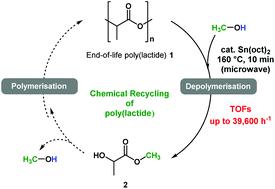当前位置:
X-MOL 学术
›
Polym. Chem.
›
论文详情
Our official English website, www.x-mol.net, welcomes your
feedback! (Note: you will need to create a separate account there.)
Tin(II) 2-ethylhexanoate catalysed methanolysis of end-of-life poly(lactide)
Polymer Chemistry ( IF 4.1 ) Pub Date : 2020-03-27 , DOI: 10.1039/d0py00292e Melanie Hofmann 1, 2, 3, 4 , Christoph Alberti 1, 2, 3, 4 , Felix Scheliga 1, 1, 3, 4, 5 , Roderich R. R. Meißner 1, 2, 3, 4 , Stephan Enthaler 1, 2, 3, 4
Polymer Chemistry ( IF 4.1 ) Pub Date : 2020-03-27 , DOI: 10.1039/d0py00292e Melanie Hofmann 1, 2, 3, 4 , Christoph Alberti 1, 2, 3, 4 , Felix Scheliga 1, 1, 3, 4, 5 , Roderich R. R. Meißner 1, 2, 3, 4 , Stephan Enthaler 1, 2, 3, 4
Affiliation

|
In recent times, plastics derived from renewable resources have received significant consideration as alternatives to plastics based on fossil resources. Nevertheless, some challenging issues, for instance the embedding of these plastics in a future circular economy, are currently under investigation. In this regard, recycling by applying chemical methodologies to reconvert the monomers would be a useful process. The selective depolymerisation/degradation of end-of-life poly(lactide) (EoL-PLA) plastics via methanolysis was explored in the presence of the industrially relevant catalyst tin(II) 2-ethylhexanoate (Sn(Oct)2). EoL-PLAs used in daily life were successfully degraded to methyl lactate utilising microwave heating. Outstanding turnover frequencies of up to 39 600 h−1 were observed.
中文翻译:

2-乙基己酸锡(II)催化寿命终止的聚丙交酯的甲醇分解
近年来,衍生自可再生资源的塑料作为基于化石资源的塑料的替代品已受到广泛考虑。尽管如此,目前仍在研究一些具有挑战性的问题,例如将这些塑料嵌入未来的循环经济中。在这方面,通过应用化学方法来再转化单体的再循环将是有用的过程。在工业相关的催化剂2-乙基己酸锡(II)(Sn(Oct)2)存在下,研究了通过甲醇分解对寿命终止的聚丙交酯(EoL-PLA)塑料进行选择性解聚/降解)。通过微波加热,日常生活中使用的EoL-PLA已成功降解为乳酸甲酯。观察到高达39 600 h -1的出色周转频率。
更新日期:2020-04-24
中文翻译:

2-乙基己酸锡(II)催化寿命终止的聚丙交酯的甲醇分解
近年来,衍生自可再生资源的塑料作为基于化石资源的塑料的替代品已受到广泛考虑。尽管如此,目前仍在研究一些具有挑战性的问题,例如将这些塑料嵌入未来的循环经济中。在这方面,通过应用化学方法来再转化单体的再循环将是有用的过程。在工业相关的催化剂2-乙基己酸锡(II)(Sn(Oct)2)存在下,研究了通过甲醇分解对寿命终止的聚丙交酯(EoL-PLA)塑料进行选择性解聚/降解)。通过微波加热,日常生活中使用的EoL-PLA已成功降解为乳酸甲酯。观察到高达39 600 h -1的出色周转频率。











































 京公网安备 11010802027423号
京公网安备 11010802027423号